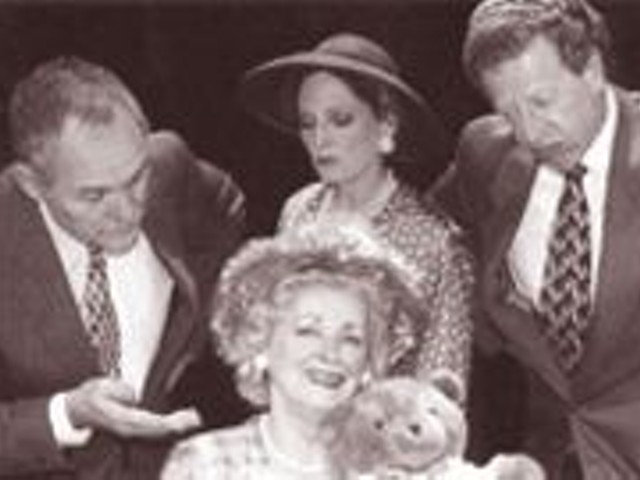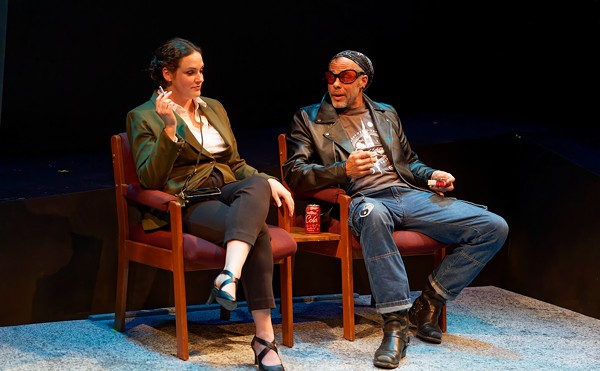Wilder deals sweetly with birth, copulation and death, and Our Town, on its surface, is, if not optimistic, certainly a dream of the way things ought to be. The dismissal of the dream, however, is right under the surface. Interrupting two actors in the middle of a scene, for example, and banishing them temporarily from the stage makes it clear that what the actors had been doing was playacting, not living.
The mover and shaker of Our Town, the Stage Manager, when played as the text has him, is on the one hand a hard-bitten fellow whose lapses into folksiness and benign wisdom almost always occur when he is apparently filling in for an actor who isn't there. On the other hand, he can become the paternal spirit of Our Town, telling us at the play's end that it's time we were all home in bed or commenting on the joys and pains of young love. Wilder's goofing with the theatrical conventions of his day, such as not using scenery or props, is also a way of getting us to pay attention to the players by making it more difficult to do so. But the actors appear in costume, and realistic sounds mark the passing of time. Although Wilder probably learned much of this unconventionality from the plays of Luigi Piarandello, he was an innovator on his own -- he first made his mark with a much-celebrated novel, The Bridge at San Luis Rey, whose narrative method seemed genuinely revolutionary when the book was published. But like his plays, Wilder's novels, whatever their experimental qualities, are always accessible. More important, Wilder's classical leanings gave him the ability, denied to almost all romantics, to be both funny and beautiful at the same time. This ability, alas, has caused his reputation to suffer. Because his dramatic folk don't writhe in anguish, because he doesn't insist that attention must be paid, because nobody has been driven mad by incest, impossible love or bad genes, they are not worth the consideration of serious people. This is the problem with romanticism and has caused great harm to the collective unconscious of the West.
Clayton Community Theatre's production of Our Town caught the sweetness of the play but missed almost all of its manifold ironies because, one is forced to conclude, the directors either didn't see them or didn't care about them. As the Stage Manager, for instance, Gary Feder came across as an uncommonly wise, gentle, benign and vigorously civil fellow with an accent far more Southern than Northeastern. He got into this characterization and stayed there -- ordinarily exactly what an actor is supposed to do and what Mr. Feder was directed to do. But he was never a stage manager. He was, instead, a citizen of Our Town, in spite of his having a laptop like the stage manager at the Rep does. Feder did an awfully nice job of what he did, but it wasn't what Wilder wrote. More on target were Ellie Schwetye and John Wehrman as the young lovers, Emily Webb and George Gibbs, whose performances were consistently believable and (as the arts cannot help but be, provided the actors don't say their lines in Estonian) consistently moving. Wehrman's first big scene, with Tom Bell as his father, Dr. Gibbs, was touching, and Schwetye's last-act scene as she visits her past was a nicely understated tear-jerker. In the role of Rebecca Gibbs, Drew Lefkowith earned some well-deserved chuckles for her mugging. Beverly Stuhlman was a suitably busybody Mrs. Soames, and Gene Rauscher, as the doomed Simon Stimson, did a hair-raising drunken walk across the stage, realistic enough to make you want to rush out and take the Pledge.
The directors, Sam Hack and Marilyn Albert-Hack, couldn't resist improving on Wilder's directions, but resist they should have. The Stage Manager's laptop was an intrusion made all the worse by the Stage Manager's making so little use of it, except to flash some extremely distracting slides on the back wall. They also might have taken more pains than they did with the seating in Clayton High School's pleasant black-box theater, for almost everyone sitting more than four rows back could see only the torsos and heads of the actors. The stage area wasn't raised and the audience area wasn't raked, but one or the other was needed.
Robert Schmidt Costumes got the credit for the costuming, which was almost always pretty good. Dr. Charles Wentworth got the credit as technical director, and if that means the lights and sound, Wentworth knew what he was about.
Despite the caveats above, Clayton Community Theatre's Our Town put at least part of the play before its audience and got through to them, and perhaps the parts that didn't get across were not wanted on a summer's evening. This production was miles ahead of where the company was when it made its premiere with Plaza Suite. As they become more experienced and develop a stable of skilled actors, as have the West End Players Guild and the Kirkwood Community Theatre, Clayton Community Theatre will make a significant contribution to the St. Louis-area theater scene.





